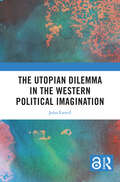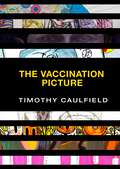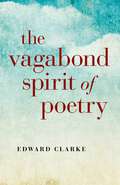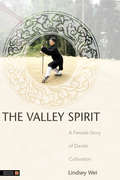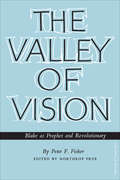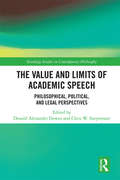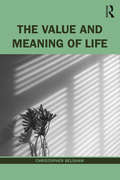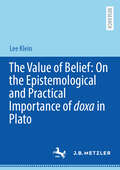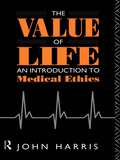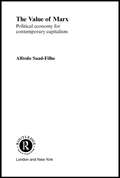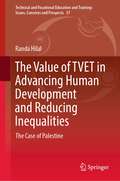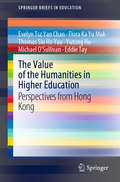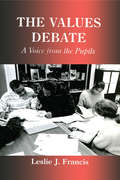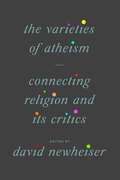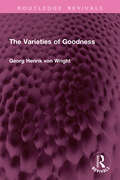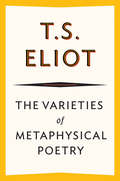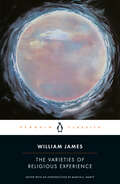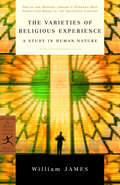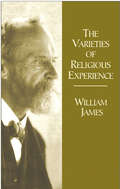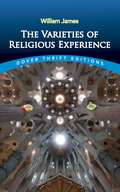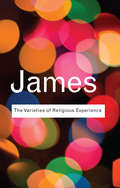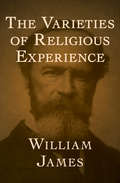- Table View
- List View
The Utopian Dilemma in the Western Political Imagination
by John FarrellIn this volume, John Farrell shows that political utopias—societies with laws and customs designed to short-circuit the foibles of human nature for the benefit of our collective existence—have a perennial opponent, the honor-based culture of aristocracy that dominated most of the world from ancient times into early modernity and whose status-based competitive psychology persists to the present day. While utopias aim at equality, the heroic imperative defends the need for personal and collective dignity. It asks the utopian, Do we really want to live in a world without struggle, without heroes, and without the stories they create? Because the utopian dilemma pits essential values against each other—equity versus freedom, dignity versus justice—few who confront it can simply take sides. Rather, the dilemma itself has been a generative stimulus for classic authors from Plato and Thomas More to George Orwell and Aldous Huxley. Farrell follows their struggles with the utopian dilemma and with each other, providing a deepened understanding of the moral and emotional dynamics of the western political imagination.
The Vaccination Picture
by Timothy CaulfieldFew topics in health policy have generated as much debate—and frustration—among public health experts as the issue of vaccine safety. Misinformation around the science of vaccination continues to spread, and too often the media fails to report bad science for what it is. Using science-informed analysis alongside original art and powerful essays, health science leader Timothy Caulfield debunks the myths and false assumptions about vaccination safety and effectiveness. Accessible, informative, and entertaining, The Vaccination Picture tells the true story of vaccines, their uses, and their positive effects for everyone.
The Vagabond Spirit of Poetry
by Edward ClarkeThis book delineates different manifestations of the vagabond spirit of poetry through the ages. In doing so, it makes claims for the efficacy of poetry in our industrialized world, where we are presented with environmental, political and economic challenges. The Vagabond Spirit of Poetry demonstrates that poems are vital now more than ever because they can transform our relations with each other and with the earth. It acknowledges the awesome power of poems by providing you with fresh ways to apprehend their profound spiritual insights. You will be surprised by how sharp your imagination becomes once you start following the paths opened by Edward Clarke's original readings. This region is full of unexpected turns and pleasant clearings. Beginning in the middle of things with Wordsworth, you will be taken on a journey from Shakespeare to Wallace Stevens. Significant older poets, including Homer, Virgil and Dante, will enliven conversations with the wisest British, Irish and American poets of the modern age. As you proceed, poetry will teach you how to put into practice its perennial wisdom.
The Valley Spirit: A Female Story of Daoist Cultivation Second Edition
by Lindsey WeiA young woman, Lindsey Wei, graduates from high school in America and sets out to find her roots in China, questing for who she is and where her life path belongs. She discovers in herself a skill for martial arts and seeks the hidden knowledge of meditation. After three years of study in various martial styles and unveiling false teachers, she is finally led to the ancient Wudang Mountains. Here she meets a Daoist recluse, Li Shi Fu, who has renounced the world of the 'red dust' and long since retired into an isolated temple to cast oracles and read the stars. The coming together of these two extraordinary characters, master and disciple, begins a spiritual relationship taking the young adept on an unforgettable journey through the light and dark sides of modern China and deep into herself. Battling between earthly desires and heavenly knowledge, she makes the transformation into a dynamic and complete woman. A coming-of-age, personal account, the book describes the lived experiences of a profoundly sincere, bitter yet ultimately liberating female quest. It is written for anyone who ponders the true meaning of Chinese wisdom and the way of the Dao in the hope of discovering a deeper strength within themselves.
The Valley of Vision: Blake as Prophet and Revolutionary (University of Toronto Department of English Studies and Texts #9)
by Northrop Frye Peter FisherThe author of this important contribution to the study of Blake was tragically drowned in a sailing accident when he had almost completed it in manuscript. His was a critical mind of singular erudition and power. As is abundantly evidenced in these chapters which Northrop Frye has prepared for publication. Fisher had made a careful study of Oriental philosophy and of Plato and the Neo-Platonists and this background enabled him to make an original and fruitful analysis of his central interest, Blake. The book is not a study of Blake's sources but of his context. The author is trying to answer the question: given Blake's general point of view, why does he make the specific judgments he does make, judgments which so often seem merely glib or petulant or perverse. Blake himself, in explaining a painting, remarked: "It ought to be understood that the Persons, Moses & Abraham, are not here meant, but the States Signified by those Names." Fisher explains what Blake meant by "states," and shows that such names as Plato, Bacon or Newton, or such terms as "priest" or "deist" in Blake's writings, refer not to individuals but to cultural forces in Western civilization, the influence of which accounted for the social conditions that Blake attacked. The attack itself, Fisher shows, was based on a revolutionary dialectic, a sense of the underlying opposition between reactionaries committed to obscurantism and social injustice, the "Elect" as Blake calls them, and the prophets committed to a greater vision (the "Reprobate"), with the mass of the public (the "Redeemed") in between.
The Value and Limits of Academic Speech: Philosophical, Political, and Legal Perspectives (Routledge Studies in Contemporary Philosophy)
by Donald Alexander Downs Chris W. SurprenantFree speech has been a historically volatile issue in higher education. In recent years, however, there has been a surge of progressive censorship on campus. This wave of censorship has been characterized by the explosive growth of such policies as "trigger warnings" for course materials; "safe spaces" where students are protected from speech they consider harmful or distressing; "micro-aggression" policies that often strongly discourage the use of words that might offend sensitive individuals; new "bias-reporting" programs that consist of different degrees of campus surveillance; the "dis-invitation" of a growing list of speakers, including many in the mainstream of American politics and values; and the prominent "shouting down" or disruption of speakers deemed inconsistent with progressive ideology. Not to be outdone, external forces on the right are now engaging in social media bullying of speakers and teachers whose views upset them. The essays in this collection, written by prominent philosophers, political scientists, sociologists, and legal scholars, examine the issues at the forefront of the crisis of free speech in higher education. The contributors address the broader historical, cultural, legal, and normative contexts of the current crisis, and take care to analyze the role of "due process" in protecting academic freedom and individuals accused of misconduct. Additionally, the volume is unique in that it advances practical remedies to campus censorship, as the editors and many of the contributors have participated in movements to remedy limitations on free speech and open inquiry. The Value and Limits of Academic Speech will educate academic professionals and informed citizens about the phenomenon of progressive censorship and its implications for higher education and the republic.
The Value and Meaning of Life
by Christopher BelshawIn this book Christopher Belshaw draws on earlier work concerning death, identity, animals, immortality, and extinction, and builds a large-scale argument dealing with questions of both value and meaning. Rejecting suggestions that life is sacred or intrinsically valuable, he argues instead that its value varies, and varies considerably, both within and between different kinds of things. So in some cases we might have reason to improve or save a life, while in others that reason will be lacking. What about starting lives? The book’s central section takes this as its focus, and asks whether we ever have reason to start lives, just for the sake of the one whose life it is. Not only is it denied that there is any such reason, but some sympathy is afforded to the anti-natalist contention that there is always reason against. The final chapters deal with meaning. There is support here for the sober and familiar view that meaning derives from an enthusiasm for, and some success with, the pursuit of worthwhile projects. Now suppose we are immortal. Or suppose, in contrast, that we face imminent extinction. Would either of these threaten meaning? The claim is made that the force of such threats is often exaggerated. The Value and Meaning of Life is essential reading for students and researchers in philosophy, ethics, and religion, and will be of interest to all those concerned with how to live, and how to think about the lives of others.
The Value of Belief: On the Epistemological and Practical Importance of doxa in Plato
by Lee KleinAs the first monograph to specifically focus on the positive evaluation of belief (doxa) as a crucial concept in Plato&’s epistemology, this work contributes significantly to scholarly research by offering a fresh perspective that deepens our understanding of Plato&’s theory of knowledge. It shows that doxa is indispensable to the acquisition of knowledge in the human life, thus disproving the long-held notion that Plato was a mere idealist in this respect.The author examines the nuanced, multifaceted role of belief in a well-chosen selection of Platonic dialogues (Meno, Republic, Theaetetus, Philebus, and Timaeus), challenging traditional as well as modern interpretations by letting belief step out of the shadow of knowledge. By offering detailed analyses of relevant arguments, engaging with previous research and providing an innovative interpretation, it is shown that doxa is not only a central but a highly versatile concept in Plato.This study appeals especially to scholars of ancient philosophy and epistemology as well as to all students of philosophy interested in Plato and epistemology.
The Value of Life: An Introduction to Medical Ethics
by John HarrisFirst published in 1985. Routledge is an imprint of Taylor & Francis, an informa company.
The Value of Marx: Political Economy for Contemporary Capitalism (Routledge Frontiers Of Political Economy Ser. #41)
by Alfredo Saad FilhoKarl Marx's writings provide a uniquely insightful explanation of the inner workings of capitalism, which other schools of thought generally have difficulty explaining. From this vantage point, Marx's works can help to explain important features and economic problems of our age, and the limits of their possible solutions. For example, the necessity
The Value of TVET in Advancing Human Development and Reducing Inequalities: The Case of Palestine (Technical and Vocational Education and Training: Issues, Concerns and Prospects #37)
by Randa HilalThis book examines the contribution of Vocational Education and Training to advancing human development and reducing inequality. It uses the example of Palestine as case-study rich in multi-layered inequalities, some of which are experienced in the region and worldwide, while others are specific to adverse conditions. The case of Palestine provides fertile ground for understanding inequality and human development, and for echoing the developed knowledge through to the understanding of Vocational Education and Training and Human Development globally. The book brings original theoretical approaches, evidence of the value of Vocational Education and Training, and contributes to academic debates, as well as provides empirical evidence for practitioners and donor community.
The Value of the Humanities in Higher Education: Perspectives from Hong Kong (SpringerBriefs in Education)
by Eddie Tay Michael O'Sullivan Evelyn Tsz Chan Flora Ka Mak Thomas Siu Yau Yutong HuThis book presents an extensive analysis of the multifaceted benefits that higher education in the humanities offers individuals and society, as explored in the context of Hong Kong. Using both quantitative graduate employment survey data and qualitative data from interviews with past humanities graduates and with leading humanities scholars, the study provides an objective picture of the “value” of humanities degrees in relation to the economic needs and growth of Hong Kong, together with an in-depth exploration of their value and use in the eyes of humanities graduates and practitioners. Therefore, although it is hardly the only book on the value and status quo of the humanities worldwide, it nonetheless stands out in this crowded field as one of the very few extended studies that draws on empirical data.The book will appeal to both an academic and a wider audience, including members of the general public, non-academic educators, and government administrators interested in the status quo of humanities education, whether in Hong Kong or elsewhere. The report also includes a wealth of text taken directly from interviews with humanities graduates, who share their compelling life stories and views on the value of their humanities education.
The Values Debate: A Voice from the Pupils (Woburn Education Series)
by Leslie J. FrancisPresents findings from a survey conducted among 30,000 13-15 year olds throughout England and Wales, giving particular attention to social, personal and moral issues.
The Varieties of Atheism: Connecting Religion and Its Critics
by David NewheiserThoughtful essays to revive dialogue about atheism beyond belief. The Varieties of Atheism reveals the diverse nonreligious experiences obscured by the combative intellectualism of Sam Harris, Richard Dawkins, and Christopher Hitchens. In fact, contributors contend that narrowly defining atheism as the belief that there is no god misunderstands religious and nonreligious persons altogether. The essays show that, just as religion exceeds doctrine, atheism also encompasses every dimension of human life: from imagination and feeling to community and ethics. Contributors offer new, expansive perspectives on atheism’s diverse history and possible futures. By recovering lines of affinity and tension between particular atheists and particular religious traditions, this book paves the way for fruitful conversation between religious and non-religious people in our secular age.
The Varieties of Atheism: Connecting Religion and Its Critics
by David NewheiserThoughtful essays to revive dialogue about atheism beyond belief. The Varieties of Atheism reveals the diverse nonreligious experiences obscured by the combative intellectualism of Sam Harris, Richard Dawkins, and Christopher Hitchens. In fact, contributors contend that narrowly defining atheism as the belief that there is no god misunderstands religious and nonreligious persons altogether. The essays show that, just as religion exceeds doctrine, atheism also encompasses every dimension of human life: from imagination and feeling to community and ethics. Contributors offer new, expansive perspectives on atheism’s diverse history and possible futures. By recovering lines of affinity and tension between particular atheists and particular religious traditions, this book paves the way for fruitful conversation between religious and non-religious people in our secular age.
The Varieties of Atheism: Connecting Religion and Its Critics
by David NewheiserThoughtful essays to revive dialogue about atheism beyond belief. The Varieties of Atheism reveals the diverse nonreligious experiences obscured by the combative intellectualism of Sam Harris, Richard Dawkins, and Christopher Hitchens. In fact, contributors contend that narrowly defining atheism as the belief that there is no god misunderstands religious and nonreligious persons altogether. The essays show that, just as religion exceeds doctrine, atheism also encompasses every dimension of human life: from imagination and feeling to community and ethics. Contributors offer new, expansive perspectives on atheism’s diverse history and possible futures. By recovering lines of affinity and tension between particular atheists and particular religious traditions, this book paves the way for fruitful conversation between religious and non-religious people in our secular age.
The Varieties of Goodness (Routledge Revivals)
by Georg Henrik von WrightFirst published in 1963, Varieties of Goodness presents analysis of the concept of value and its relations with the neighbouring concepts of fact and norm. The author discusses important themes such as instrumental and technical goodness; utilitarian goodness; goodness of faculties; active and passive pleasure; ethical hedonism; ideals of happiness; divisions of the virtues; connection between values and norms; concept of duty; and justice. This is a must read for scholars and researchers of philosophy.
The Varieties of Metaphysical Poetry
by T. S. EliotThe famed series of Trinity College and Johns Hopkins lectures in which the Nobel Prize winner explored history, poetry, and philosophy. While a student at Harvard in the early years of the twentieth century, T. S. Eliot immersed himself in the verse of Dante, Donne, and the nineteenth-century French poet Jules Laforgue. His study of the relation of thought and feeling in these poets led Eliot, as a poet and critic living in London, to formulate an original theory of the poetry generally termed &“metaphysical&”—philosophical and intellectual poetry that revels in startlingly unconventional imagery. Eliot came to perceive a gradual &“disintegration of the intellect&” following three &“metaphysical moments&” of European civilization—the thirteenth, seventeenth, and nineteenth centuries. The theory is at once a provocative prism through which to view Western intellectual and literary history and an exceptional insight into Eliot&’s own intellectual development. This annotated edition includes the eight Clark Lectures on metaphysical poetry that Eliot delivered at Trinity College in Cambridge in 1926, and their revision and extension for his three Turnbull Lectures at Johns Hopkins University in Baltimore in 1933. They reveal in great depth the historical currents of poetry and philosophy that shaped Eliot&’s own metaphysical moment in the twentieth century.
The Varieties of Religious Experience
by William James Martin E. MartyThis collection defining documents from one of America's most influential thinkers presents Pragmatism in its entirety, James's seminal set of lectures in which he argues in his witty and limpid style for the "reasonableness of ordinary experience." Also gathered here are selections from James's other formative works, including The Meaning of Truth, Psychology, The Will to Believe, and Talks to Teachers on Psychology.<P><P> Chosen for Mark Zuckerberg's "A Year of Books"
The Varieties of Religious Experience
by William JamesHarvard philosopher William James's compiled lectures on religion, considered to be among the most brilliant studies of mankind's relation to the divine <P><P> William James's Varieties of Religious Experience brings together twenty lectures on the nature of religion, delivered at the University of Edinburgh between 1901 and 1902. Renowned at the time for their practical and even-handed approach to the human experience of religion, the lectures form a sympathetic and analytical portrait not of the church, but of the personalized experiences of religious life. James examines the words of writers and philosophers from Immanuel Kant to Plato to Ralph Waldo Emerson to Marcus Aurelius in his investigations of faith, the soul, and systems of belief. Praised by philosopher Charles Pierce for its "penetration into the hearts of people" and by the New York Times for its ability to stir the sympathies of readers, The Varieties of Religious Experience is a lucid and thought-provoking examination of man's encounters with God.<P> Chosen for Mark Zuckerberg's "A Year of Books"
The Varieties of Religious Experience
by William JamesSelected by the Modern Library as one of the 100 best nonfiction books of all time<P><P> The Varieties of Religious Experience is certainly the most notable of all books in the field of the psychology of religion and probably destined to be the most influential [one] written on religion in the twentieth century' said Walter Houston Clark in Psychology Today. The book was an immediate bestseller upon its publication in June 1902. Reflecting the pluralistic views of psychologist-turned-philosopher William James, it posits that individual religious experiences, rather than the tenets of organized religions, form the backbone of religious life. James's discussion of conversion, repentance, mysticism, and hopes of reward and fears of punishment in the hereafter--as well as his observations on the religious experiences of such diverse thinkers as Voltaire, Whitman, Emerson, Luther, Tolstoy, and others--all support his thesis.<P> Chosen for Mark Zuckerberg's "A Year of Books"
The Varieties of Religious Experience: A Study In Human Nature
by William JamesFirst-rate study of spirituality documents and discusses a variety of religious states of consciousness, covering the meaning of the term "divine," reality of the unseen, religion of healthy-mindedness, sick soul, divided self and process of its unification, conversion, saintliness, and mysticism. Studded with richly concrete examples; a classic of its genre.
The Varieties of Religious Experience: A Study In Human Nature (Dover Thrift Editions: Religion)
by William JamesUpon completing the monumental The Principles of Psychology, William James turned his attention to serious consideration of such important religious and philosophical questions about the nature and existence of God, the immortality of the soul, and free will and determinism. His interest in these subjects found expression in a variety of works, among them, this classic study of spirituality.James based The Varieties of Religious Experience on his participation in the University of Edinburgh's Gifford Lectures on Natural Religion. Studded with concrete examples, it documents and discusses various religious states of consciousness and covers such topics as the meaning of the term "divine," the reality of the unseen, the religion of healthy-mindedness, the sick soul, the divided self and the process of its unification, conversion, saintliness, and mysticism. This work remains one of the great books on the subject, particularly for the evidence it cites for religious experience as a unique phenomenon.
The Varieties of Religious Experience: A Study In Human Nature (Routledge Classics)
by William James'Is life worth living? Yes, a thousand times yes when the world still holds such spirits as Professor James.' - Gertrude Stein A classic of American thought, William James’ The Varieties of Religious Experience is an extraordinary study of human spirituality in all its forms and one of the most profound works of Psychology ever written. When the book was published in 1902 the study of the human mind was a thrillingly new field of scientific enquiry: James was one of the first to seriously examine the psychology of religious faith and where he led, both Jung and Freud would follow. Yet for all its historical significance, this is a book full of humanity, wit and some deeply personal stories of revelation, religious devotion and mystical experience. The Routledge Classics edition of The Varieties of Religious Experience makes available in paperback for the first time the Centenary Edition published by Routledge in 2002 with new introductions on the historical and contemporary significance of James’ work and a foreword by the author’s grandson, Micky James.
The Varieties of Religious Experience: A Study In Human Nature: Being The Gifford Lectures On Natural Religion Delivered At Edinburgh In 1901-1902
by William JamesHarvard philosopher William James&’s compiled lectures on religion, considered to be among the most brilliant studies of mankind&’s relation to the divine William James&’s Varieties of Religious Experience brings together twenty lectures on the nature of religion, delivered at the University of Edinburgh between 1901 and 1902. Renowned at the time for their practical and even-handed approach to the human experience of religion, the lectures form a sympathetic and analytical portrait not of the church, but of the personalized experiences of religious life. James examines the words of writers and philosophers from Immanuel Kant to Plato to Ralph Waldo Emerson to Marcus Aurelius in his investigations of faith, the soul, and systems of belief. Praised by philosopher Charles Pierce for its &“penetration into the hearts of people&” and by the New York Times for its ability to stir the sympathies of readers, The Varieties of Religious Experience is a lucid and thought-provoking examination of man&’s encounters with God. This ebook has been professionally proofread to ensure accuracy and readability on all devices.
